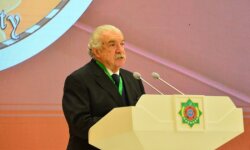These activities focused on preserving coastal ecosystems of the Caspian Sea, combating desertification and planting trees in cities.
 Now, the significance of environmental issues, which are essential for sustainable development of human society, is recognized worldwide more than ever. Turkmenistan pays particular attention to nature conservation. A leader of the 'Ecodurmush' (Ecolife) public organisation, a lecturer at Turkmen Agriculture University Aynabat Atayeva told CentralAsia.news about these activities.
Now, the significance of environmental issues, which are essential for sustainable development of human society, is recognized worldwide more than ever. Turkmenistan pays particular attention to nature conservation. A leader of the 'Ecodurmush' (Ecolife) public organisation, a lecturer at Turkmen Agriculture University Aynabat Atayeva told CentralAsia.news about these activities.
Cooperation with international organisations
Turkmenistan takes an active part in promoting international cooperation and implementing joint projects aimed at addressing the environmental problems that require urgent attention, such as conservation and restoration of water and other natural resources, desertification control, land degradation, global warming and climate change.
In this area, our country closely works with the major international organisations, including the United Nations, the European Union and the Global Environment Facility, generating constructive solutions to global environmental problems for the benefit of the present and future generations on the planet.
The microclimate across the country, particularly at the foothills, has improved significantly through the successful implementation of the large-scale environmental programme.
Cooperation in addressing environmental issues is a key aspect of the foreign policy of Turkmenistan that fosters a constructive international dialogue in this area.
Preservation of Caspian Sea ecosystems
In recent years, much work has been done to clean the riverbeds and give a new life to the Caspian Sea coast, where the Avaza national tourism zone stretches. One of the major requirements is environmental compliance of all facilities under construction in the littoral region.
With the aim of preserving Caspian Sea ecosystems, biological wastewater treatment equipment was installed at each terminal of the Turkmenbashi international seaport. The seaport project was developed in compliance with the GreenPort international standard.
The dredged soil from the construction site of the new sea harbour was used to create an artificial island for migratory birds in the bay near Turkmenbashi town.
The 170-hectare island provides breeding, nesting and wintering habitat for hundreds of thousands of birds, including swans that have much larger populations there this winter.
Several transcontinental bird migration routes intersect in Turkmenistan’s coastal zone of the Caspian Sea. The fact that a fifth of the world’s population of the greater flamingo spends winter there illustrates the importance of this territory for birds.
Tree planting
Planting trees and creating parks and public gardens in the seaside resort is of paramount importance.
Now, according to Turkmen specialists and authoritative international experts, Turkmenistan has the most environmentally friendly sector of the Caspian Sea, which is a result of the consistent and targeted work in this area.
Every year, the President of Turkmenistan launches a nationwide tree planting campaign. The green belt encircling the capital city shelters it from dusty winds and improves air quality, contributing to conserving and enhancing biodiversity.
Much work on nature protection and biodiversity and natural landscape conservation is being done in the framework of the National Climate Change Strategy and large-scale social and economic development programmes.
Eco-friendly technologies
Supporting international efforts to reduce greenhouse gas emissions, our country takes successive measures to adopt modern eco-friendly and resource-saving technologies in the industrial sector.
The country with one of the world’s largest deserts and arid climate is reaping the fruits of long years of work and employing cutting-edge forest technologies in a new area.



